How to solve (deal with) your family problems (conflicts) (issues) (resolution) | How to end a family fight | How do you overcome family life? | What are common problems in family? | Causes of family conflicts and how to resolve them
Hello friends, how are you doing today? Welcome to #Relationships-Parenting website / blog.
Let you and your well-wishers live a happy and prosperous life through out your life term.
In this website / blog, you will always learn about #Relationships #Parenting.
Also subscribe / follow to our various social media networks from here to learn more about #Relationships #Parenting:
Just before going to “How to solve (deal with) your family problems (conflicts) (issues) (resolution) | How to end a family fight | How do you overcome family life? | What are common problems in family? | Causes of family conflicts and how to resolve them“, let us know a brief, basic and very important information.
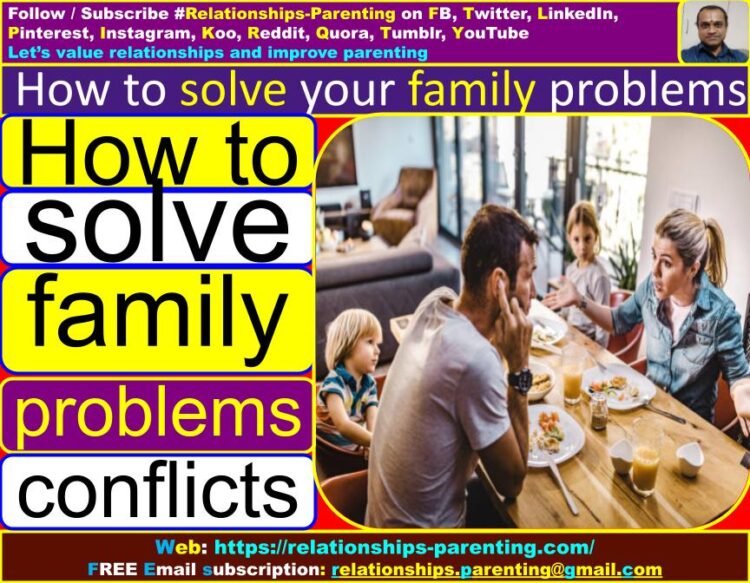
Some of the common questions asked or related to this subject are as given below:
How to solve family problems between husband and wife | How to solve family problems essay | How to solve family problems and conflicts essay | How to solve family problems between father and mother |
How to solve generation gap in family | Essay about my family problems and how they were solved | What did you do to resolve the said conflict in your family |
Solutions to family problems | Short paragraph about family problems and solutions | Personal experience about family problems |
How to solve family problems and conflicts essay | Family problems causes and solutions | Causes of family problems | Causes of family conflicts and how to resolve them | And many others…

Let’s find solutions to all these questions.
Meaning of family : A family is a group of people related by blood (identified by birth) or affinity (identified by marriage or other relationships).
Purpose of a family : The main purpose of the family is to safeguard the welfare of its members and the society as a whole.
Maturity of the family members : Ideally, the family or families often provide the future, foundation, and security as members learn to participate in adulthood and the well-being of the family and community.
Why family is require : Historically, most human societies have used the family as the primary place of bonding, attachment, nurturing, and socialization within and outside the family.
Anthropologists classify most family organizations as given below:
Matrifocal family : A mother and her children. | Patrifocal family : A father and his children. | Conjugal family : A wife, her husband, and children. This is also called as nuclear family. |
Avuncular family : A man, his sister, and her children. | Extended family : In addition to parents and children, may include grandparents, aunts, uncles, or cousins).
Extended families consist of several generations of people and can include biological parents and their children as well as in-laws, grandparents, aunts, uncles, cousins, etc.

The field of genealogy aims to track-down family ancestry through history. The most important economic unit studied in family economics is the family.
The term “families” can be used metaphorically to generate more inclusive categories such as the global village, society, community, and nationhood.
How conflicts arise in the family : A dysfunctional family or an unstable family or an unstable household or an argumentative family or a sensitively critical family is a family:
in which conflict(s), problem(s), misbehavior, and often neglect or abuse of children or other family member(s), and sometimes all of the above on the part of individual parents occur continuously and regularly, causing other members to accommodate such actions.
Children or sensitive people in such families sometimes understand that such a situation is normal.
Dysfunctional or unstable families are primarily the result of two adults, one often openly abusive and the other codependent, and may be affected by substance abuse or other forms of addiction, or sometimes even untreated mental illness.
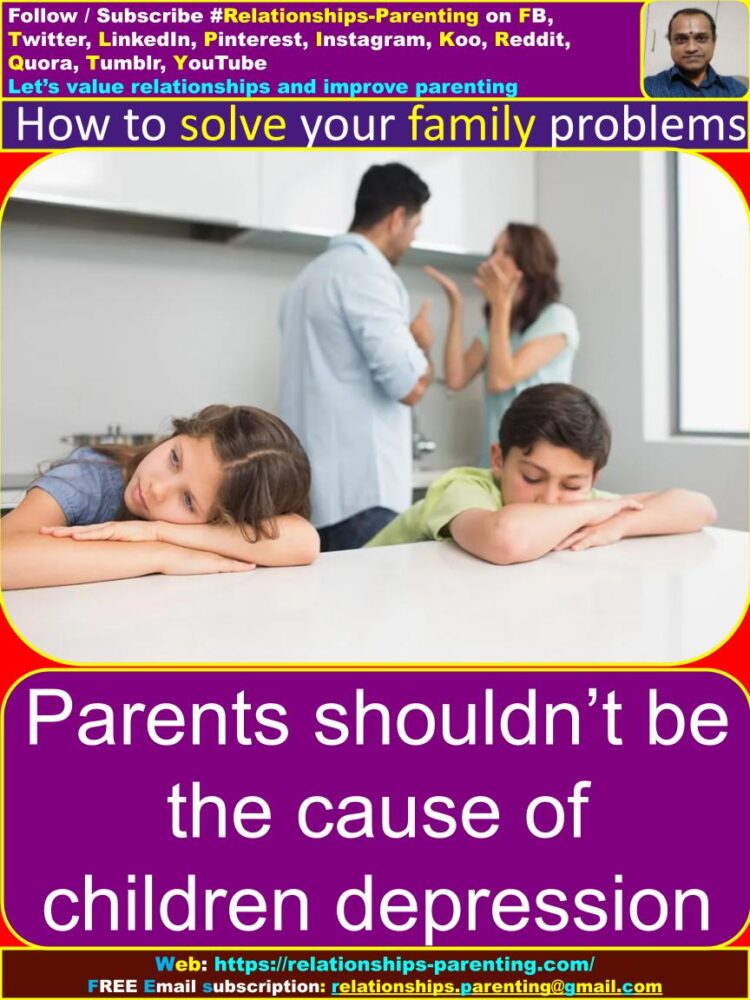
Parents (once children) raised in dysfunctional families may overcorrect or imitate their own parents in the later stage. In some cases, the dominant parent abuses or neglects their children and the other parent does not object at all, leading the child to assume guilt.
List of the “How to solve (deal with) your family problems (conflicts) (issues) (resolution) | How to end a family fight” is as given below:
First kick out the ego (pride) in you : The first and foremost thing we must always remember is that we have to nullify our egos and unnecessary pride.
If you think that what you think is the only right way, you are on the wrong path and you need to correct yourself quickly. There are billions of people in this world and everyone has their own calculations about family matters and you are just one of them.
This post is not about not using your own logic and intellect, but you should always think like a family member before making any final decision(s).
Family is not just you. A family has different members and you are a part of the family. As a family member you should first think about the betterment of your family and then think about yourself.
This does not mean that you are not important, but it does mean that you should always think as a whole family before making any final decision(s).

Frequent causes of family conflict : Research has well identified that certain stages a family goes through can lead to conflict as follows: Early stages of a new couple, birth of first child, birth of other child(ren), period of child going to school, child becoming a youth, youth becoming an adult, etc.
One or more of these stages can create new and different stresses and potential conflict points in the family.
Changes in the family situation can take a toll on the family and lead to one or more conflict(s) as given here: Separation or even divorce, moving to a new home or place or country, long distance travel for work, interstate travel for work, sudden change in financial conditions etc.
Each parent’s opinions, values, and needs may also change, and they may find that they no longer match each other.
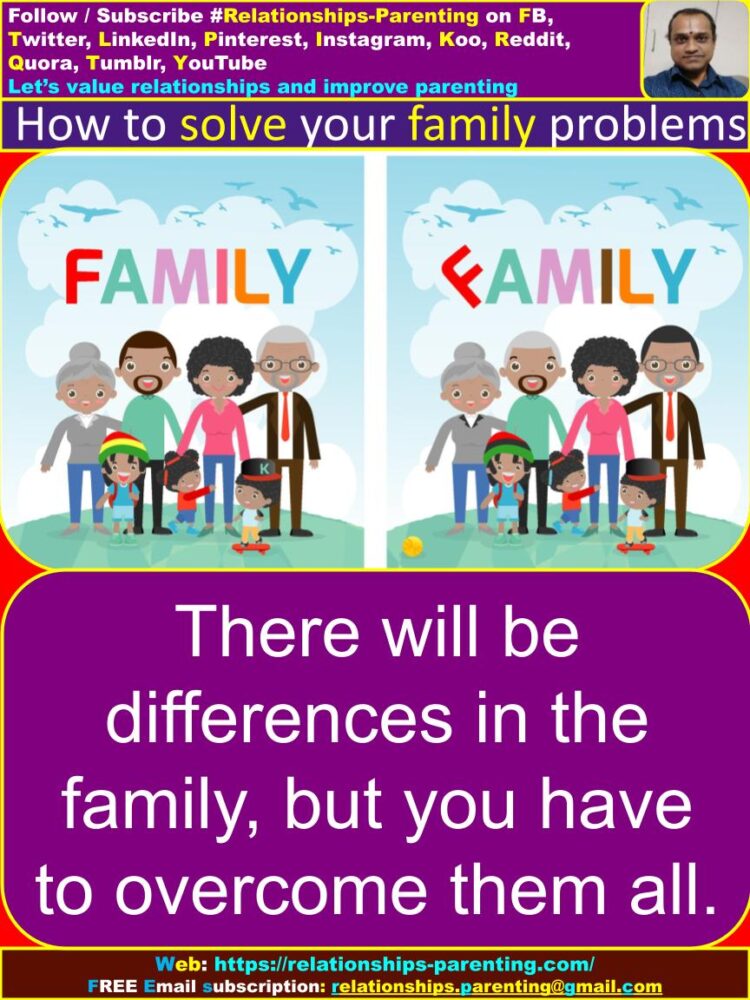
Set aside time to talk as a caring family : Sometimes, facing and overcoming family issues or problems or conflicts seems almost impossible.
However, when you work together as concerned family member(s), resolving family differences becomes more feasible and possible. The first step major step toward a solution is admitting that there is a problem in your family in the first place.
Then, after tempers have cooled moderately, everyone needs to come together as a caring family and plan to come up with a strategy to solve the problem.
Schedule a family meeting at a time that is most convenient and appropriate for everyone in your family. Let each and every family member know the sensitivity of the issue of the meeting and that you want them to arrive with suggestions and solutions during the meeting.
Keep in mind that very young children can disrupt family gatherings. Let them be in a separate room if you expect to discuss temper related issues or sensitive information.
Experts often advise that holding regular and caring family meetings automatically improves family bonding and reduces conflicts in the family. This simple and easy technique enables family members to bring up problems before family resentments develop and avoids all psychological conflicts.
Talking regularly with your family improves mutual understanding and can automatically develop the communication and bond you share with your family.

Work distance : Due to distance from work, travel to work or other personal or official reasons, it can put a huge strain on an otherwise happy and healthy relationship.
Moreover, if you have children, it can be even more challenging to be away from them for long periods of time, especially if you have to travel a lot.
If you can’t change the frequency and length of work hours, there are some other things you can do to bridge the gap between you and your family.
For example, you can video chat with your family at night, play online games together, or you can sync movies to watch together with your family. In today’s digital age, there are many simple solutions to easily bridge the distance between you and your family.
Distance problems arise not only from long distance travel, but also from not providing enough space (independence) for family members.
Previous research says that if two people love each other, they can spend every minute of their time happily. In the first few months of dating it seems like just a fantasy game, any serious relationship needs space not for a few days, but for a lifetime.
Your better-half or anyone in the family will always be special. They have their own interests and disinterests. Let them live their own lives too, provide them space and freedom.
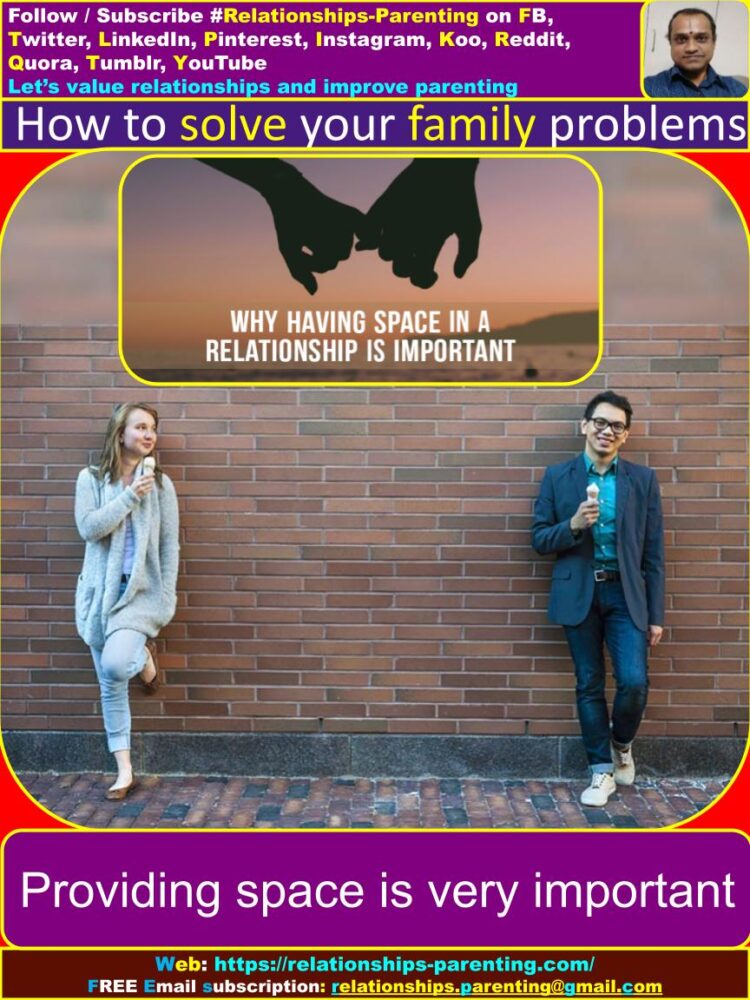
Discuss when your mind is calm : Family issues can sometimes be very painful, especially during family-centered times, such as the holidays.
If your family members are constantly arguing and bickering, waiting for everyone to calm down will help prevent any further disagreements between them. Don’t discuss a family issue when you’re still feeling upset or emotional.
Because an upset mind cannot produce the desired result. If you wait at least one night, the intensity of the feeling is likely to lessen somewhat, even if you are still unhappy with the other family member.
Waiting for a day or two allows you to approach the problem more logically rather than emotionally. If you take a step back and give yourself and your family some time to think before dealing with a problem, you won’t be dealing with it reactively.
Approaching someone when you’re angry adds unwanted intensity to an already difficult situation. There’s no reason for you to wait until a day or two later to do your thing, so control your instant temper for sometime.

Accept agreement and then negotiate : Often, our first reaction to anger is to push the point that we are always right and win the argument at any cost. At times, when both parties stubbornly stick to their guns, finding a peaceful way out seems almost difficult, if not impossible.
It would help if everyone decided as a family to listen and negotiate with each other instead of continuing to think “I’m always right.”
Few of the suggestions for this is as given here: Work on if the problem is worth fighting for, try to separate the problem from the person, if you get too angry to talk things out try to cool down your mind first.
Remember that the idea is to resolve the conflict and not to win the argument, remember that the other party is not always obligated to agree with you on everything.
Peacefully define the problem and always stick to the topic, respect the other person’s point of view by paying full attention and listening, speak clearly, responsibly and reasonably, try to find points of common ground, try to agree to disagreements, etc.

Focus only on the present issue : When disagreements arise, people tend to bring up any old unresolved issues they faced with the other party earlier in their lives. You must forgive all old issues.
With constant whining, you and your family members will have to face a lot of unnecessary pain. This completely prevents conflict resolution and blurs the point of your discussion about your family members. Always strive to uncover what is important about the current issue.
Repeating the same old problem(s) again and again will only increase your suffering and that of your family members. Building a case or bringing up old misdeeds will not help you in solving the current problem.
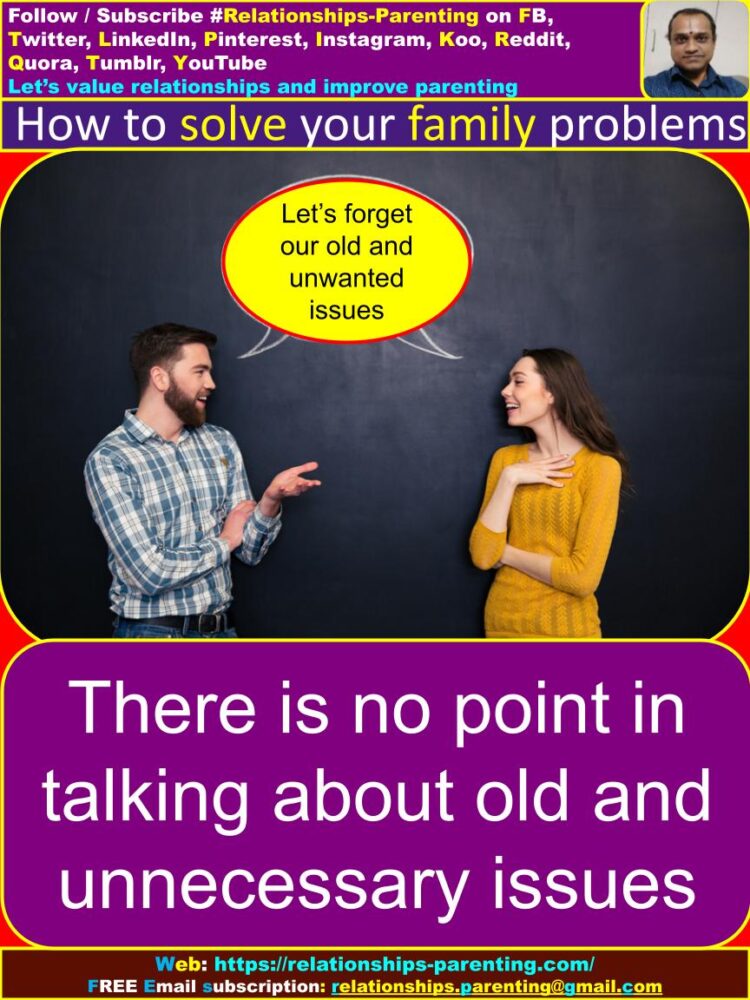
Deal family issues personally : We are all modern people. We are very proud and happy to use the latest gadgets all the time. However, trying to resolve an argument or family issue via instant messenger or email is the worst possible option.
Personal discussions improve your ability, awareness and inclination to filter out all your unnecessary suffering. This is because your tone can be very easily misunderstood with today’s so-called electronic communication.
You may not think you’re angry, but you can be, via text or email, to the person on the receiving end of it. Instead of sending a text, pick up the telephone and arrange an in-person meeting to his/her favorite spot.
People say things over electronic communication that they would never say at another person’s face, which is another reason to avoid it altogether.

First listen, then talk : Conflict can increase exponentially when the people involved are too angry to listen to other family members.
To avoid such kind of misunderstandings, try to follow this from here: Set your mood to be calm, try to keep your emotions aside, don’t interrupt the other person when he/she is talking, actively listen to what he/she is saying and also what they are trying say.
Check that you understand them by asking simple questions, communicate your side of the story clearly and honestly, try to resist the urge to bring up other older unresolved and unrelated issues.
Direct, calm and direct communication is essential to effectively resolve conflict(s). Each person should use “I” statements to articulate your wants, needs, and concerns. (Here “I” means not ego, but owning your own statements).
Remember, you should always aim to de-escalate the conflict and work towards a better and lasting solution. Using “I” statements permits everyone to express himself/herself and shows respect for what others are asking and listening to.
Making “I” statements admits each person to take ownership of what he/she is experiencing and at the same time suggests a solution to the problem.
Examples of “I” statements include these: “I am worry that our family is disintegrating”, “I would like us to work things out as soon as possible and to resolve all our issues at the earliest.”
“I get scared when dad smokes too much because when he smokes he starts coughing a lot.” “I don’t want to see mom fighting with dad, I want to see them love each other and not abuse each other.”
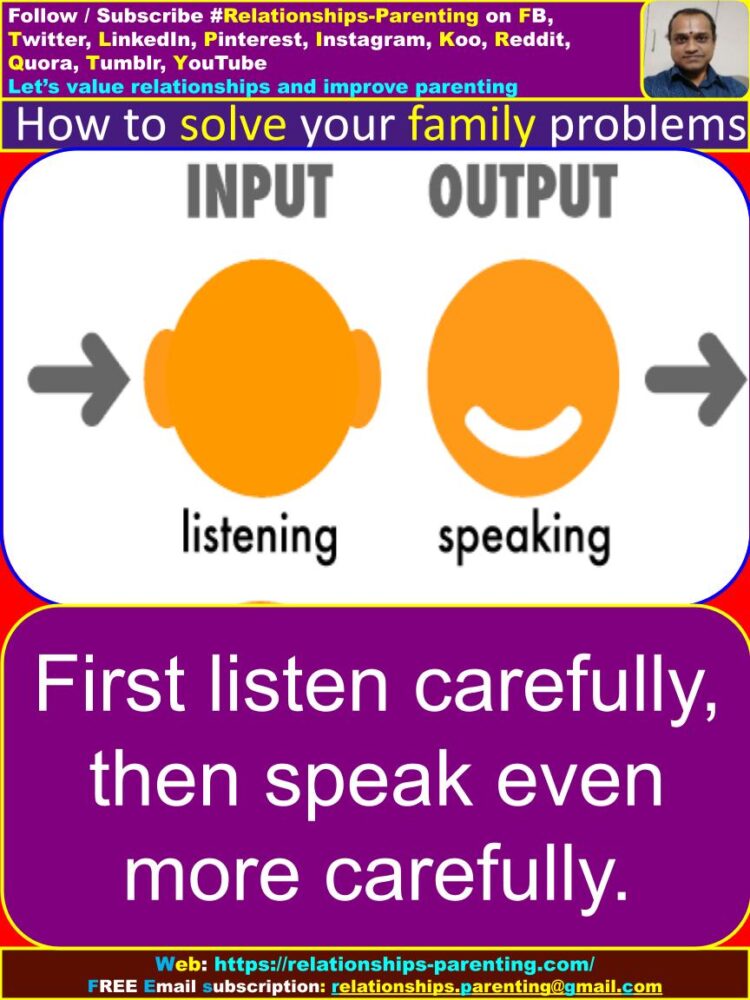
Value each person’s point of view and show respect : Giving value means showing another person that you recognize, respect, and accept his/her thoughts, viewpoints, or beliefs.
Of course, your own views may differ greatly, but using valid points shows that you see others as human beings, deserving of integrity and respect. Validate your family member by saying, “I’m so glad you feel comfortable enough to share your thoughts with me,”
Or “I appreciate your willingness to work toward a solution together.” You have every right to draw your own boundaries to protect yourself.
For example, you may still see some negative family members in family functions. If you don’t want to talk to them, you can avoid them, but you shouldn’t be rude to them. However, perhaps you have decided to never visit them, and you have every right to do so.

How to handle difficult Children : It is always more challenging when dealing with difficult, naughty, mischievous and disobedient children. From toddlers to teenagers, parenting the “terrible children” can be challenging, and sometimes it can feel like you’re at the end of the road.
While you can’t control your children’s each and every action, know that you can control how you teach them right lessons and to handle decisions and behaviors.
You can set a positive environment and example for how you choose to respond to your own frustration.
With younger children exhibiting volatile emotional states and strategies, a fine balance of patience and firmness is key, which you as a parent must accommodate. When it comes to manage older kids, acting out may mean they just want to be heard of their feelings.
So, rather than jumping straight to punishment, try listening to what your teenager has in his/her mind. The best way for a child to learn is by thinking through important decisions with a mature adult like you (parents).

Understand the right time to step back : There are few family issues that simply cannot be fixed at all. Some family issues take time to resolve. Problems are always changing. Some are difficult to solve, some are easy to solve.
You may realize that cutting out family members who are causing unacceptable problems for you and the rest of your family is actually healthier for you.
You may not be able to accept who you are due to certain family issues, such as grief over a loved one or parental incompetence. Instead, you may have to admit that you have tried your best to communicate and connect with your family member, but all has gone in vain.
Then you may need to move on from the problem and try to live your life as best you can. Even if such situations are intensely personal, usually you should consider removing the family member from your life if the family problem involves physical or sexual abuse.
But this should be your last and final step. Don’t rush to this conclusion. You should think several times before you take this final step.
Do not tolerate abuse of yourself or others in your family. Cases of abuse should be reported to the police or child protective organization.
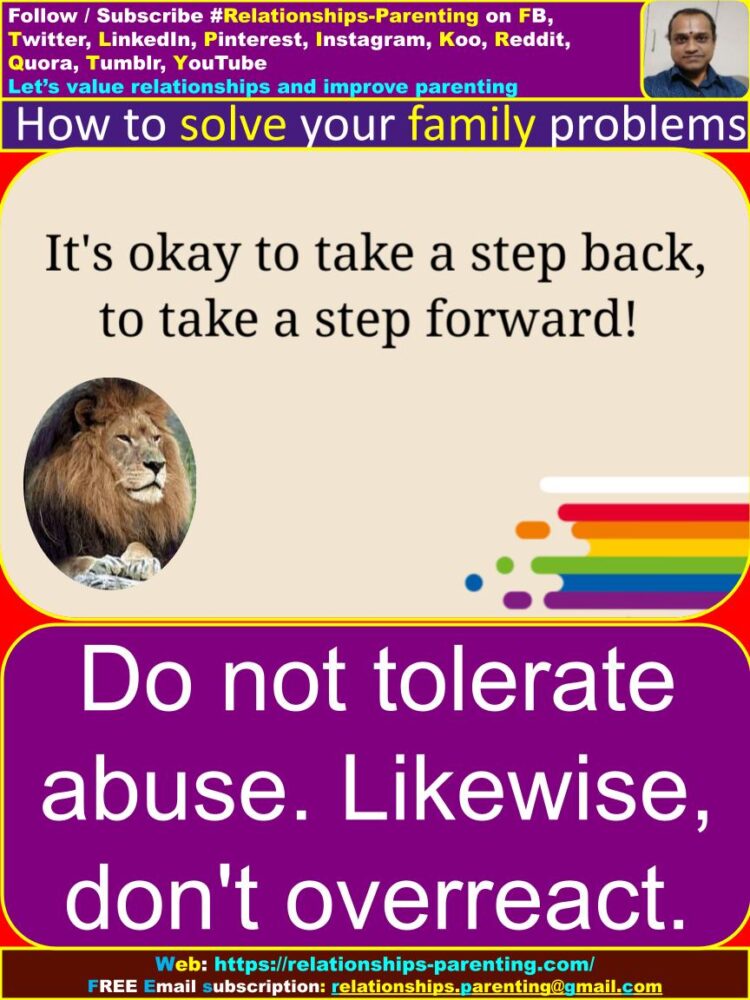
Together as family, you can solve any problem : Once everyone in your family shares their needs, wants, and concerns, you as the parents (father and mother) have to make the final decision together.
Consider all the suggestions provided by each member of your family and find the best solution for your entire family as a single unit.
Each and every member should feel good about the proposed solution. If necessary, talk to each member of your family about how you will handle the problem.
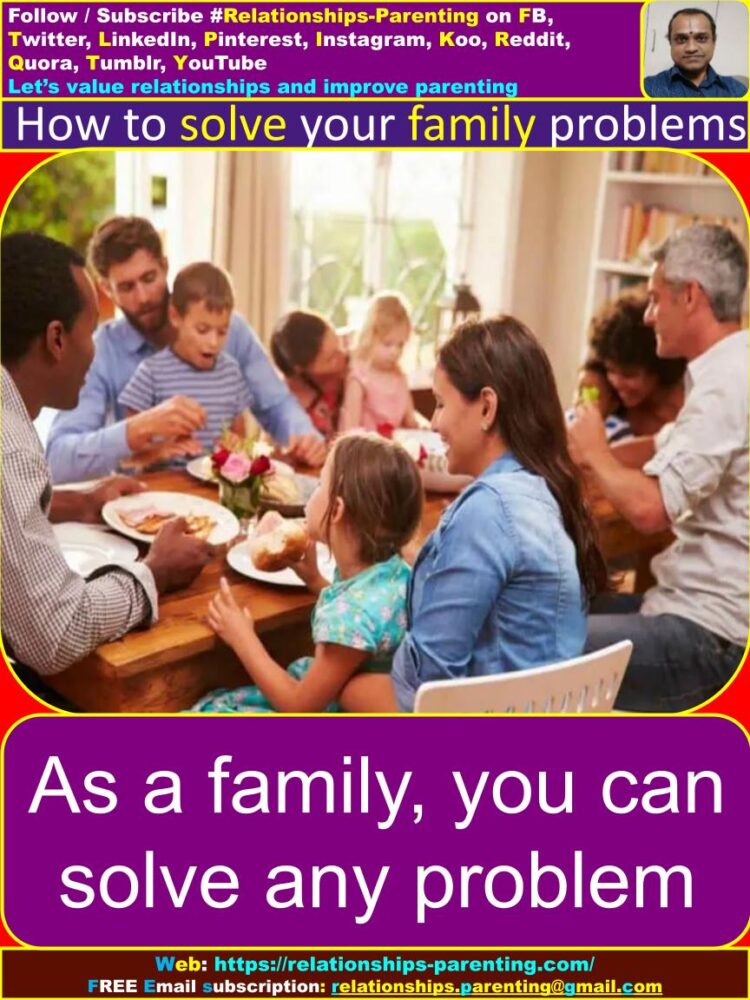
More information will be added to this on regular basis. Please visit this post and blog / website to know more about relationship and parenting.
Continue reading about:
To know more about “Husband and wife information, facts“, please click the below link:
Husband and wife information, facts
Dear friends, if you need any clarifications about this post, kindly let me know, I will definitely try to answer all of them.
Also add your COMMENT below, SHARE on different SOCIAL MEDIA networks.
This will help to know the quality of this content and also it will be helpful to know if any improvements is required for the content.
If you feel this content is useful to you and has helped you to improve your knowledge, kindly share this with your well-wishers.
Because “SHARING MEANS CARING”.
To receive FREE EMAIL SUBSCRIPTION about #Relationship #Parenting, you can send an email to [email protected] from your email ID.
Let you and your well-wishers live a prosperous, healthy and fearless life through out your life term.